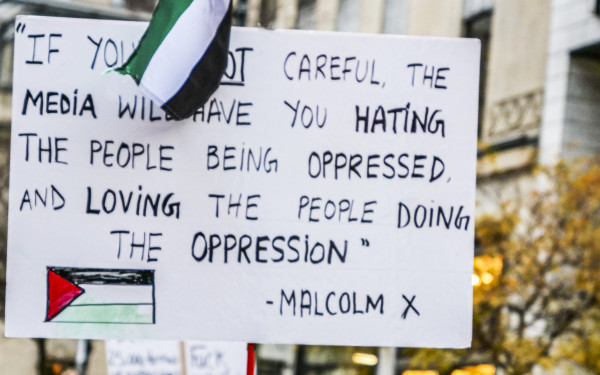Yidlife Crisis Proves that Yiddish is Hardly a Dead Language
Yiddish Makes a Comeback in this Comedic Web Series
If Yiddish is a dead language, then Eli Batalion and Jamie Elman are necromancers.
The pair created the online comedy series Yidlife Crisis, a story following two guys, Leizer and Chaimie, as they trace a line through the cultural and geographic landmarks of everyday Jewish life in Montreal. But everywhere they go, and with most everyone they engage with, they speak in Yiddish.
The show first went up on YouTube in September 2014, and is one of a broader collection of videos exploring Jewish life in the 21st century. For example, their newest series overdubs iconic movie scenes in Yiddish.
“That’s another fun and different exploration of how to get a rise out of people that’s somewhere between comedic and educational,” Batalion says. Serving as the bedrock of the broader project, Yidlife Crisis fits firmly within that philosophy of creation.
The show portrays the touchstones of Jewish life in a way that really brings a sense of reality to what could otherwise feel absurd. And the show feels real, say Batalion and Elman, because many of the show’s premises and conversations come from actual discussions that the pair have had with their friends.
After the success of their first season, they took the show on the road to Jewish communities around the world, and those stories also went into season two. One idea in the last episode of the season comes from an experience in Tel Aviv. There, they encountered orthodox Jews with tefillin—leather straps tied tightly around the arms and forehead—on the way to the gay pride parade.
Each implied bondage in its own way to Batalion, and so the episode ends up exploring ideas of sexual and religious bondage from sex shops to orthodox talks. “Somehow wrapping that together, so to speak,” Batalion points out.
Still, at its core, the show is just these two guys, childhood friends who learned Yiddish in high school. “To a certain extent it reflects Jamie. To a certain extent it reflects me,” Batalion says. His character, Leizer, is an odd mix of religio-secular, the kind of guy who separates his cheese and his meat even though he’s unconvinced God exists.
On the other hand, Elman’s character Chaimie is more anti-establishment, but still deeply versed in the traditions that he claims to dislike. He’ll smoke a joint before Rosh Hashana but will defend the legitimacy of a new convert to Judaism when he’s there. The two are complex and contradictory figures, whose stories unfold naturally.
Those stories range from Rosh Hashana and circumcisions to bagels and Christmas, Yidlife Crisis gives ample space for exploring the places where the traits of Jewish modernity rub against each other.
The finale of the first season, a conversation that follows the roots of “Jewish” cuisine to all of its goy —or non-Jewish—origins, is a good example of this. It’s perhaps the only time the show puts up blinking arrows to say “Hey, we’re talking about Jewish identity here!” After all, that’s the undercurrent of the whole thing.
However, that explicit discussion comes to a conclusion after finding the basis of a culinary identity to be a mix of many in an exchange is immediately recognizable to any modern Jewish person.
“If you’re a fellow secular Montreal Jew, then you understand that we have so many conflicting, oftentimes but sometimes not, identities.” – Jamie Elman
Batalion’s character, Leizer, lays it out: “We’re not just one thing. We’re not just Jews. We’re not just gentiles. We’re ‘ish.’” Jew-ish, religious-ish, kosher-ish, scientific-ish, superstitious-ish, it goes on.
“All cultures rub off on other cultures,” Elman’s character Chaimie says, sitting in a Greek restaurant, eating pita, and speaking Yiddish.
“If you’re a fellow secular Montreal Jew, then you understand that we have so many conflicting, oftentimes but sometimes not, identities,” says Elman.
The show is a place to hash out those questions of what it means to be Jewish, but also what a secularizing and technological West means for any sort of spiritual identity. That’s why the show’s grounding in lived reality matters so much, even as a comedy.
“Comedy is a very strong choice of medium to be able to discuss the often touchy, controversial, or complex issues of identity,” Elman explains.
To Batalion, Yidlife Crisis is about questioning in general. It casts a wide net of inquiry, from racist comments in a Chinese restaurant to understanding the LGBTQ community in Orthodox spaces.
“We believe that Judaism is very much a questioning religion,” he says.
Even with the kinds of questions that are meant to challenge and change the religion, it’s easy to see how the use of Yiddish gives their critiques an ancestral legitimacy. “What’s encouraging is the fact that even though we’ve gone against dogma […] we’ve had nothing but support.”
At the beginning of April, the pair received a grant from the Natan Fund. Each year the fund gives $40,000 in grants to select members of the ROI Community, a network supported by the Charles and Lynn Schusterman Family Foundation, to help Jewish activists connect and create. This is Yidlife Crisis’ second consecutive year getting the grant.
“We’ve been more absorbed into the institution as a result of [the show],” says Batalion. “Which is pretty nutty considering it’s such an irreverent project at it’s heart.”
The first grant helped bump the production value from their first to second seasons, and enabled them to make a new website. This year, Elman and Batalion want to expand their platform and try new ways of communicating Jewish stories and history, like that concept of overdubbing scenes in Yiddish.
The biggest goal of the show, and of the growing projects that surround it, is to present a novel, open, and inclusive look at Judaism.
“We feel the whole thing will be better if we can all just make fun of our own cultures and traditions and recognize the similarities between them,” Batalion says. “And that we’re all, you know, friends.”
Yidlife Crisis // http://yidlifecrisis.com/


_600_375_90_s_c1.jpg)


